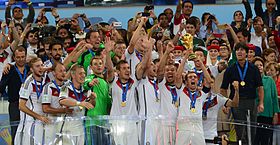What makes a person excellent at their craft? Countless articles, books, movies, and such try to convince consumers that there are simple rules to success. Take one event as a microcosm for success - the Super Bowl. Tonight, the New England Patriots take on the Philadelphia Eagles for one of the most watched events on television per capita (worldwide). Don't believe me? Here are the numbers (all rounded for simplicity):
Top Event: Cricket World Cup match between India and Pakistan (2015) had 1 billion viewers. If we assumed that only those two countries and the host country (Australia) were interested in the event, we have a 1.5 billion people. Now that seems a bit of a stretch. We know that 14 teams qualified and presumably people from those 14 nations would be interested in the outcome of that seemingly critical match leaving us with 1.9 billion or roughly 53% of the interested parties watching. Cricket appears to be more popular than any American could ever imagine.
 Runner Up: World Cup Final in Rio de Janeiro (2014) had 3 billion viewers. Assuming that the world was interested in this event (given that it is called the "World Cup"), we can assume that the 3 billion came from the world's 7.6 billion for an estimated 39% of the total world population. Not a bad showing world!
Runner Up: World Cup Final in Rio de Janeiro (2014) had 3 billion viewers. Assuming that the world was interested in this event (given that it is called the "World Cup"), we can assume that the 3 billion came from the world's 7.6 billion for an estimated 39% of the total world population. Not a bad showing world!Super Bowl (last year): 112 million people in the US watched the game last year and we have 324 million viewers available giving us a 35% viewership per capita.
I don't expect it to be a good game but there is plenty we can all learn from the game and the two teams' preparation/execution. Specifically, what makes a winning organization different than a...well...an organization that fails to win? Mountaineering expeditions share many of the same attributes as these professional organizations. The players prepare, anticipate and plan for as much of the game as could be expected, and they rest prior to the game. The coaches prepare the players but also make decisions during the game to help the players be their best while exploiting their opponents weaknesses. We mountaineers do the same as these players and organizations but the game is slightly different; the player, the opponent, and the decision-makers are one in the same - me. So, what can I learn from these organizations to make me more successful?
1. Don't follow the leader - find out what works for you. I learned this the hard way many years ago when I tried to emulate elite athletes and their training programs. They had extreme routines that I simply could not adhere to and, as a result, often felt like a failure. Slowly, throughout the process, I learned that I had to listen to my own body and build up gradually. What those elite athletes didn't tell me (us) is that they were like me at one point too and they didn't start off with such extreme routines.
2. Learn to rest. Stress + Rest = Success. It is important to develop a workout routine and stick to it to the best of your ability BUT it is vitally important to rest. All the work you put into your body only results in success if you allow your body to recover. Most endurance athletes over-train and eventually burn out. If you learn to rest when you need it, you will be ready to take on the next workout and make even greater gains.
3. Immerse yourself into your craft. There is no shortage of tales where the "excellent" describe a life focused on their craft early on. These peak performers read everything, they talk to others about their insights, they test these insights empirically without reliance on authority or weak evidence. By immersing yourself, you learn what others may refuse to learn. Be better by reading, thinking, and testing.
So if you are lucky enough to live in an area where the game can be watched with relative ease, I suggest you think of these three things. My suspicion is that the team that creates their own formula for success, shows up rested and focused, and studied diligently well before game time will be the victor. Oh yeah, I also suspect that the team with Tom Brady will win....a non-trivial factor.
Enjoy the day and see you on my next day off. By the way, my friend Jane asked about my workouts. If you care to see how I am faring, check out the Google Sheet where I store scheduled and actual workouts. You'll see that I took the past two days off due to unreasonably low HRV scores. See? I listen to my own advice. Thanks for following.



No comments:
Post a Comment